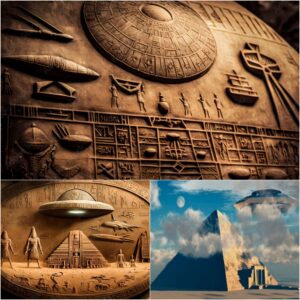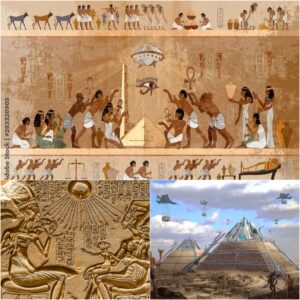Though the Anunnaki are recognized by scholars as the gods of ancient Mesopotamia, some unconventional theorists propose a different perspective, suggesting that they were ancient extraterrestrial invaders from the planet Nibiru.

Before Zeus became prominent among the Greeks or Osiris was venerated by the Egyptians, the Sumerians held the Anunnaki in reverence.
These ancient Mesopotamian gods, characterized by wings, horned caps, and the power to control all of humanity, were regarded by the Sumerians as celestial beings who molded the destiny of their society.

However, some theorists challenge the notion that the Anunnaki were merely deities, asserting instead that they were extraterrestrials from another celestial body. Even more intriguingly, these theorists rely on ancient Sumerian texts to support this audacious claim.
The Sumerians, who inhabited present-day Iraq and Iran between the Tigris and Euphrates rivers from 4500 to 1750 B.C., achieved remarkable technological advancements. They invented the plow, developed cuneiform as one of the earliest writing systems, and established a method of timekeeping still in use today.

According to Sumerian beliefs, these achievements were attributed to the Anunnaki, a group of gods descending from An, a supreme deity controlling the fate of human kings and fellow gods.
Despite a lack of comprehensive understanding about Sumerian civilization, evidence of their beliefs is found in ancient texts such as the Epic of Gilgamesh, one of the earliest written stories in human history.
In the 20th century, the “ancient alien” theory gained traction, particularly through the work of Zecharia Sitchin. His book, “The 12th Planet,” presented translations of Sumerian tablets related to Enki, asserting that the Anunnaki originated from the distant planet Nibiru.

According to Sitchin, Nibiru’s elongated orbit of 3,600 years brought it close to Earth approximately 500,000 years ago. Allegedly seeking gold to repair their planet’s atmosphere, the Anunnaki genetically engineered primitive humans for gold mining.
By the time the Sumerians emerged, the Anunnaki had imparted knowledge, enabling humans to write, solve mathematical problems, and plan cities — foundational elements for the development of human civilization.

While Sitchin’s claims may seem far-fetched, his books gained widespread popularity. Joined by authors like Erich von Däniken and Immanuel Velikovsky, Sitchin argued that the Sumerian texts were not mythological stories but rather scientific journals of their time.
Mainstream academics dismiss these ideas, citing potential mistranslations and misunderstandings of Sumerian texts. Critics argue that the unusual beliefs in these texts may stem from a lack of sophisticated understanding in the Sumerian era.

Despite skepticism, proponents of the ancient alien theory highlight the advanced achievements of the Sumerians and the alleged references to “flying machines” in their texts. However, with ongoing translation efforts and unexcavated texts, much remains to be learned about the Sumerians and their civilization.
As debates continue, the legacy of the Sumerians as pioneers of human advancement is acknowledged, raising questions about the possibility of extraterrestrial influences on ancient civilizations — a topic that remains speculative and subject to further exploration.







